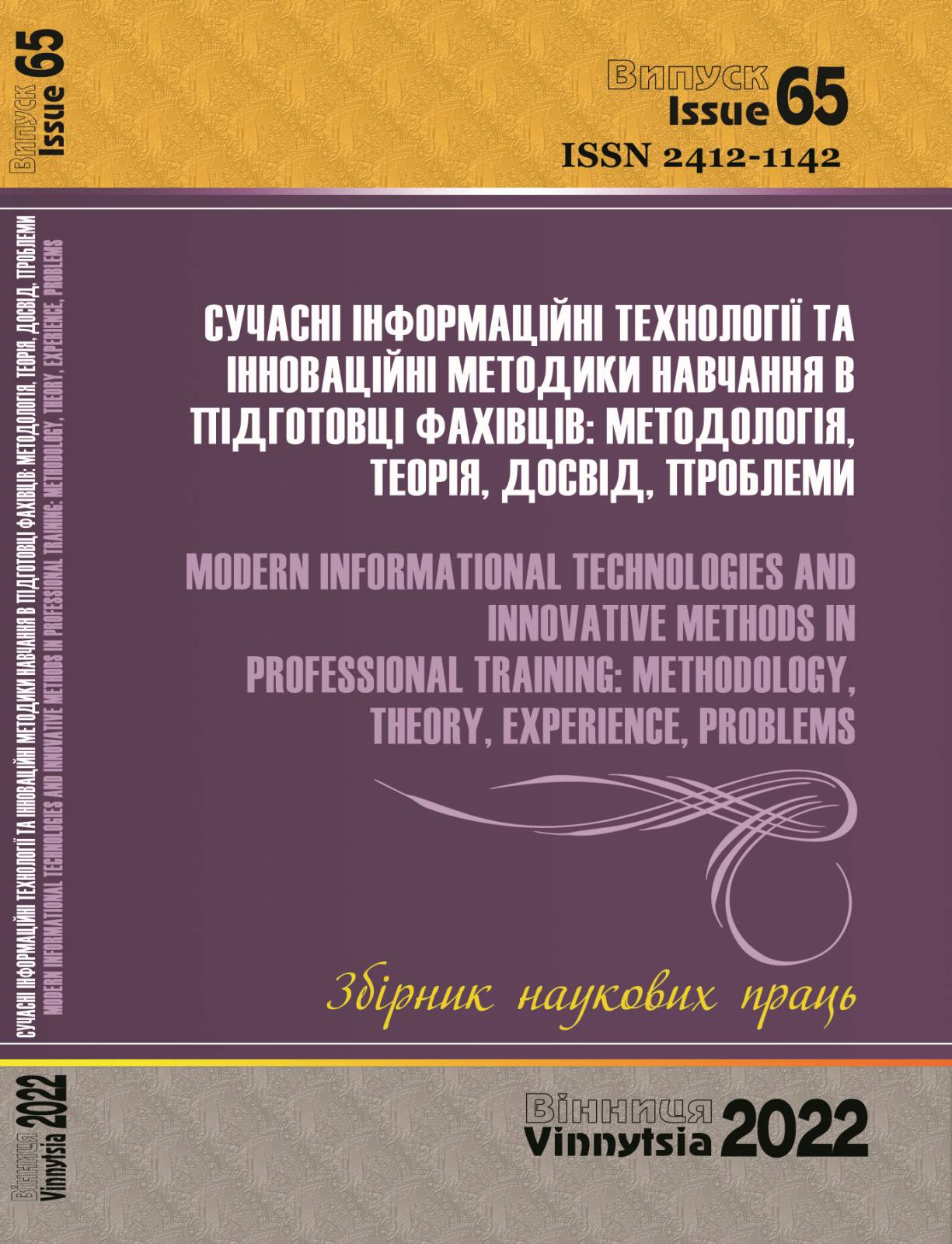ВИКОРИСТАННЯ ІНФОРМАЦІЙНИХ РЕСУРСІВ У ПРОФЕСІЙНІЙ ПІДГОТОВЦІ МАЙБУТНІХ УЧИТЕЛІВ: ДОСВІД, ПРОБЛЕМИ, ПЕРСПЕКТИВИ
DOI:
https://doi.org/10.31652/2412-1142-2022-65-5-20Ключові слова:
інформація; інформаційні ресурси; інформаційно-комунікаційні технології; знання; майбутній учитель; професійна підготовка; педагогічний експериментАнотація
В статті проаналізовано поняття «інформаційні ресурси» (ІР) та висвітлено проблеми
використання їх у професійній підготовці майбутніх учителів. ІР – це, перш за все, джерело
відповідним чином організованої інформації, ресурс у вигляді запасу, який можна використати в
разі потреби, засіб, можливість, якими можна скористатися в разі необхідності.
З кожним роком навчання у педагогічних закладах вищої освіти (ЗВО) дедалі більше варіюється в
залежності від напряму, за яким здійснюється підготовка вчителя. З одного боку, це зумовлено
тенденціями інформатизації суспільства, з іншого, – розвитком, спеціалізацією й ускладненням
інформаційно-комунікаційних технологій, з третього боку, – профілізацією навчання в закладах
загальної середньої освіти та ЗВО. Крім того варто відзначити ще одну виявлену проблему: у
педагогічних ЗВО системність у розробленні, накопиченні та практичному використанні ІР. ІР є
організаційним, комплексом, що поєднує в собі зміст навчальної дисципліни та педагогічні
прийоми її засвоєння в системі комп’ютеризованих форм освітньої роботи. Як правило, подібні
засоби ніяк не пов’язані між собою та невиправдано дублюють одну й ту саму інформацію, що
дуже часто призводить до проблем змістовного та методологічного характеру.
Очевидно, що вироблення теоретичних підходів до навчання майбутніх учителів з використанням
ІР та сервісів інформаційного освітнього середовища мають сприяти формуванню у випускників
педагогічних ЗВО потреби в системному застосуванні таких засобів та технологій у подальшій
професійній діяльності.
Експериментально доведено, що навчання майбутніх учителів з урахуванням особливостей
застосування ІР сприяє підвищенню ефективності підготовки майбутніх учителів, а також
їхнього навчання до майбутньої професійної діяльності в умовах інформаційного освітнього
середовища.
Завантажити
Посилання
А. В. Гриньов, О. А. Компанієць. Знання як основний ресурс сучасної економіки. Академічний огляд.
No 1 (32). С. 16–22.
Р. С. Гуревич, Г. Б. Гордійчук, М. Ю. Кадемія та ін. Інформаційно-освітній портал у підготовці
майбутніх учителів : монографія / за ред. доктора педагогічних наук, професора, дійсного члена
НАПН України Гуревича Р. С. Вінниця : НіланЛТД, 2017. 416 с.
О. Д. Довгань. Інформаційні ресурси: національні та державні, зміст, поняття. Інформація і право. 2015.
No 3(15). С. 85–91.
Доктрина інформаціологічного розвитку людства у ХХІ столітті ; за редакцією Ю. М. Воронцова,
І. Й. Юзвішин. Луганськ, 2001. 51 с.
М. Г. Коляда. Інформаційна культура економіста в умовах ринкової економіки. Педагогіка і психологія.
No 2. С. 73–80.
Т. А. Костецька. Інформаційне право України. Київ: Київ. нац. торг.-екон. ун-т, 2009. 170 с.
В. Г. Кремень. Модернізація освіти в контексті інноваційних тенденцій розвитку суспільства. Проблема
освіти у Польщі та в Україні в контексті процесів глобалізації та євроінтеграції : Зб. матеріалів Міжн.
науково-практичної конференції. 22-24 квітня, 2009 р. Київ-Житомир / За ред. В. Кременя,
Т. Левовицького, С. Сисоєвої. Київ: КІМ, 2009. С. 24–36.
В. П. Кубко. Інформаційні ресурси. Конспект лекцій для студентів спеціальності 7.020105 –
документознавство та інформаційна діяльність денної та заочної форм навчання. Одеса: ОНПУ, 2007.81 с.
А. О. Малюкіна. Cутність поняття «знання» та його види. Сучасні проблеми управління підприємствами:
теорія та практика: матеріали міжнар. наук.-практ. конф. Харків: ХНЕУ ім. С. Кузнеця, 2018. С. 58–61.
А. О. Малюкіна. Теоретичні основи ринку знань та класифікація знань. Економіка і суспільство. 2018.
Випуск 14. С. 720–724.
Е. М. Остапенко. Формування інформаційної культури майбутнього лікаря засобами математичного
моделювання : дис. ... канд. пед. наук : 13.00.04 / Вінницький державний педагогічний університет
імені Михайла Коцюбинського. Вінниця, 2021. 279 с.
Я. М. Пилинський. Інформаційно-телекомунікаційні технології і сучасна освіта: співдружність чи
конкуренція. Інформаційно-телекомунікаційні технології в сучасній освіті: досвід, проблеми,
перспективи. Зб. наук. пр. Ч. 1 / за редакцією М. М. Козяра та Н. Г. Ничкало. Львів : ЛДУ БЖД, 2009.
С. 106–109.
Про інформацію: Закон України від 2 жовтня 1992 року No 2658-XII. URL:
laws/show/2657-12/ed20110106 (дата звернення 30.09.2022).
Про Національну програму інформатизації : Закон України від 1998 р. Відомості Верховної Ради України
(ВВР). 1998. No 27–28. Ст. 181.
Олег Сидоренко. Інформаційні ресурси як об’єкт інформаційних правовідносин. Підприємство, господарство і право. 2018. No 4. С. 173–182.
Я. Б. Сікора Використання методів управління знаннями для організації електронного навчання.
Інформаційні технології і засоби навчання. 2017. Том 61. No 5. С. 162–174.
Філософський енциклопедичний словник / За заг. Ред. В. І. Шинкарука. Інститут філософії
ім. Г.С. Сковороди НАН України, Київ: Абрис, 2002. 742 с.
І. С. Чиж. Україна: шлях до інформаційного суспільства. Київ: Либідь, 2005. 119 с.
R. Barnett. Reconfiguring the University. Higher Education Reformed / Ed. by Peter Scott. London and New
York : Falmer Press, 2000. P. 114–129.
T. H. Davenport, L. Prusak. Working Knowledge. Harvard Business School Press, Cambridge, MA, 1998. 135 р.
T. H. Davenport, L. Prusak Working Knowledge: How Organizations Manage What they Know. Harvard
Business School Press Boston, 2000. 240 p.
Завантаження
Опубліковано
Номер
Розділ
Ліцензія
Авторське право (c) 2022 Гуревич Роман , Галина Гордійчук, Леонід Коношевський , Олег Коношевський , Віктор Соловей

Ця робота ліцензується відповідно до ліцензії Creative Commons Attribution 4.0 International License.





